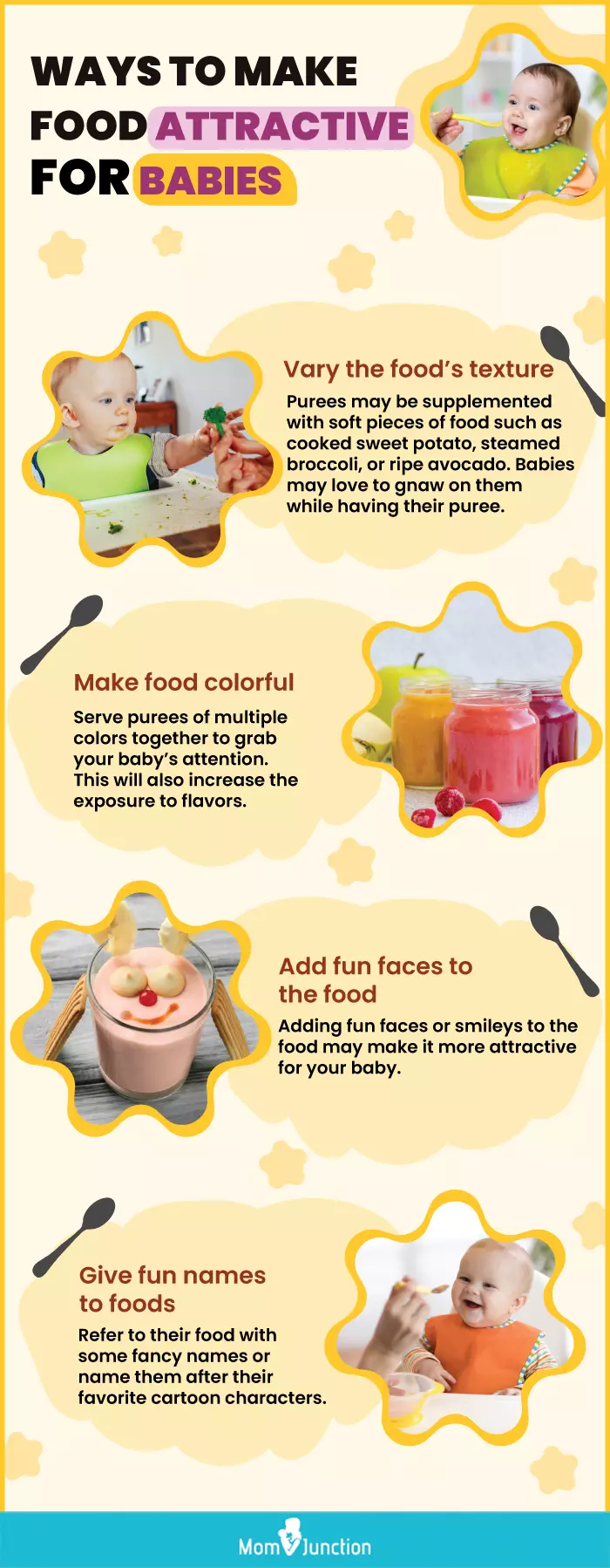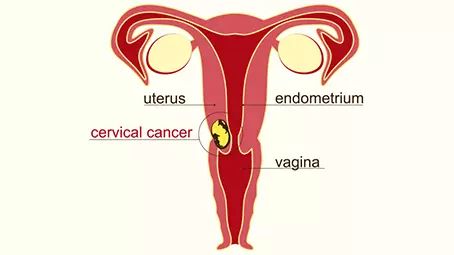
Image: Shutterstock
An appetite slump is a common problem where a baby refuses to eat. Babies have immature digestive systems that progressively develop as they grow, causing changes in their appetite. An appetite slump may normally occur in some situations, such as teething. While refusing food is a common phase for many children, it can be distressing for parents, often raising concerns about their baby’s health and nutrition. If you are worried your baby is not eating properly or may be undernourished, consult a pediatrician to know if there is an underlying cause.
This post tells you possible reasons for your baby’s refusal to eat and what you can do about it.
Key Pointers
- Your baby refuses to eat due to distractions during mealtime, aversions to certain foods, not ready for solids, or going through teething.
- Try reducing the portion size of each meal, prepare attractive meals, and make mealtimes happy and fun.
- Ensure to visit a doctor if your baby has been refusing to eat for a few days, looks dehydrated, contracts infections, or has a fever.
Possible Reasons For A Baby’s Refusal To Eat
Below are the various conditions and situations that could affect a baby’s appetite, causing refusal to eat (1).
- Not ready for solids: Most babies begin eating solids between eight to twelve months of age. However, there may be instances when the baby is not yet ready to eat solids and instinctively rejects the food. It typically happens among young babies who have just begun eating solids.
Dana, a blogger and mother of two, recalls her experience introducing solids to her daughter. She writes, “Progressing to purees/baby food was challenging. Once she had a handle on purees, progressing to real stuff (yogurt, applesauce) was challenging, too. (That started to really happen around 15 mos old). Then, progressing to real food was a lot of work, because things just get lost in her mouth—her tongue had to learn to move the food to her teeth, her jaw had to learn to make her teeth chew. (She still has to work a lot on chewing because her jaw muscles are weak. And her mouth is still disorganized.) We were on all “real” foods for around 27 months. Now, her diet is pretty limited to things you don’t have to chew too much (i).” - Too many fluids: Babies have small tummies that fill pretty quickly. Thus, if a baby frequently drinks water and other liquids, such as fruit juice, soup, and coconut water, they may refuse to consume main meals, which could result in inadequate nourishment. This is likely to be an issue in older babies who are already on solids.

- Distraction at mealtime: Babies have a short attention span, causing them to grow distracted easily. Experts recommend maintaining calm, distraction-free meal times for babies and toddlers. Media use, such as watching TV, during meals can cause faster eating and overeating due to satiety goes unrecognized (2). Dr. Nidhi Rawal, a Pediatric Gastroenterologist recommends, “Avoid using screens such as phones, TV, tablets, etc. during meal time. Instead, read a story book during mealtime to make it more fun for your child (9).”
- Aversion to certain foods: Babies may prefer some foods and dislike others based on the food items’ appearance, smell, or taste. A baby may refuse to ingest a food item they dislike. Some babies might decline to eat a food item if they have a bad experience, such as gagging on it.
- Playing with foods: Young babies find foods with different shapes, colors, and textures attractive, and they may be more inclined to play with the food than eat it. This phase usually comes when babies begin self-feeding. The situation may come across as bothersome to parents, but most babies grow out of it eventually.
- Growth spurt and activity variation: Babies have periods of growth spurt where their appetite increases, but their appetite may slump once the spurt is over (3). In these instances, the baby may abruptly start refusing to eat. Similarly, active babies tend to eat more, but their appetite may reduce temporarily on days when they are inactive.
- Fear of feeding: Research shows babies may refuse to eat if they have experienced stress, fright, or fear while feeding. It can happen due to several reasons, such as forced feeding or accidental choking (4). Parents must practice healthy feeding habits to prevent the baby from developing negative feeding behavior.
- Teething: Teething can cause temporary loss of appetite in babies and toddlers. This is often due to pain from tender and swollen gums. It is usually due to pain caused by tender and swollen gums. Research shows that babies and toddlers may lose their appetite when specific teeth, such as canines, are coming through (5). Moreover, teething causes frequent mouthing of things, which induces gagging and leads to food aversioniAn extreme dislike of a specific food associated with unpleasant physical symptoms. .

- Constipation: When babies transition from breast milk or formula to solids, bowel habits can change. A baby experiencing constipation due to these changes may temporarily refuse to eat. In such situations, you need to monitor changes in your baby’s bowel movements to determine the presence of constipation (6).
- Acid reflux: Acid reflux causes the baby to throw up what they eat. Chronic reflux or gastroesophageal reflux diseaseiA condition in which the stomach content moves back into the esophagus, causing a baby to spit up food or fluid. (GERD) may even lead to inflammation in the esophagus and pain while swallowing, causing the baby to refuse to eat (7).
- Food intolerance: Babies may have food intolerances, such as lactose intoleranceiA disorder in which the body cannot digest lactose (the sugar present in dairy foods) due to lack of lactase enzyme. and gluten intoleranceiAn immune-system disorder where a person experiences pain and other gastric symptoms upon consuming gluten-containing foods. (celiac disease). These could cause adverse effects, such as abdominal pain, vomiting, and diarrhea, making a baby or toddler refuse to eat as they find it difficult to digest the food in their diet (8).
Beyond the above conditions, a baby refuses to eat for miscellaneous reasons, such as when feeling sleepy, when unwell, or when they are simply not hungry. Some babies with certain physical anomalies, such as cleft palateiA developmental defect marked by an unusual opening at the roof of the mouth. , could be more likely to refuse to eat. It is essential to evaluate the reason behind the baby’s poor appetite to prevent undernutrition.
 Quick fact
Quick factTips To Help Babies Eat
Parents could consider the following points to manage a baby’s poor appetite and rekindle their interest in eating (1) (9).
- Consult a pediatrician. A doctor can determine the reasons behind a baby’s refusal to eat. For instance, if a baby refuses to eat due to constipationiA condition in which stools become hard, dry, or lumpy, leading to difficulty during bowel movements , the doctor may suggest dietary changes to relieve constipation. Some babies who refuse to eat due to ill-health could be prescribed medication to improve health.

- Feed smaller amounts at a time. A baby or toddler may lose interest in eating if they are always offered large quantities of food at a time. They have tiny tummies that fill up easily. Therefore, feed smaller but frequent meals.
- Don’t force-feed a baby or toddler. Force-feeding makes the mealtime stressful, creating a negative perception about eating in the baby’s mind. Similarly, never force a toddler to finish everything on their plate. Instead, teach them to eat as much as possible, depending on their hunger and satiety cues.
 Quick tip
Quick tip- Offer healthy snacks at regular intervals. It ensures your baby gets small portions of food to munch on, instead of eating large quantities at a time, causing them to refuse meals later.
- Monitor your baby’s appetite over a week or so. Sometimes, babies eat less only on some days. Eating less, being picky, or refusing to eat one or two days a week shouldn’t be a concern.
- Try making meals attractive and appealing. Older babies and toddlers often need to be lured to eat food based on its presentation. You may make mealtime interesting by serving foods in appealing ways. You may also provide various finger foods, which the baby can eat and enjoy with their own hands.
- Let your child develop a taste for new foods. If your baby dislikes a specific food and becomes fussy, don’t stop feeding it completely. Instead, serve it in different styles at regular intervals until your baby or toddler develops a taste for it. Research highlights that it may take ten or more exposures to a new food for an infant to accept it (2). It is good to offer new foods with familiar foods to make the baby or toddler adapt to its taste easily.
Trista Best, a registered dietitian from Dalton, Georgia, says. “Parents can decide which foods to introduce first, whether fresh or frozen and ensure their baby’s first foods include a variety of fruits and vegetables, with potential allergens spaced at least three days apart.”

- Avoid bribing your baby to eat food. It will make them eat even when they are stuffed, which is not good for health. Also, they may consider eating food as a means to attain treats.
- Let your child play with the food but ensure that they eat some of it in between. Younger babies often play with their food, and it is their way of understanding different textures before beginning to self-feed.
Lauren Hall, a mother, describes how she encouraged her son to have a good appetite by letting him play with his food. She says, “When I was growing up, there was a distinct ‘don’t play with your food’ rule, and I know I’m not alone. I also told both of my kids not to play with their food, and my son is possibly worse than my daughter in this department. He likes to line up his food in neat little rows and then munch on the end chunks, one piece at a time…This used to drive me insane. Now, though, we encourage that kind of play. It makes the food more interesting to him, and you know what? He actually eats the whole little line of oddly arranged food (ii).”
- Make mealtimes happy and playful. Eat with your baby or toddler and interact with them while eating. Avoid other distractions, such as television and cell phones. Do not rush feeding the baby and let them take their time.
 Quick fact
Quick factWhen To See A Doctor?

Most babies develop a healthy feeding pattern and interest in food eventually. However, if that is not the case and your baby refuses to eat, you may consult a pediatrician (9) (10). You may also see a doctor if your baby:
- Persistently refuses food for more than a few days
- Has poor weight and height gain
- Loses weight
- Gags each time they are fed something
- Appears dehydratediA condition where the body loses more fluid than it absorbs and lethargic
- Cries and complains or seems to have abdominal discomfort
- Displays possible signs of infections, such as fever, vomiting, or diarrhea
- Displays signs of allergy, such as hivesiA skin condition that causes raised, itchy, red bumps or blotches or facial swelling, after eating certain foods
Beth Kraus, Speech Language Pathologist and Senior Clinical Specialist at the Department of Pediatric Otolaryngology, “Often, parents can identify that something isn’t quite right during mealtimes, but they have a hard time quantifying the frequency or identifying specifics of the problem when they are in the office with the specialist. Having some data collected beforehand will help the specialist complete a more comprehensive assessment right from the initial encounter.”
Parents should monitor signs and keep a log of what was fed in every meal, the quantity of foods, any changes in meals, and the behavior of the child before, during, and after feedings. It will allow the pediatrician or feeding specialist to determine the precise cause of food refusal.
Frequently Asked Questions
1. My baby is not eating. Should I worry?
It depends on your baby’s age and how long they have been refusing to eat. Babies can go through phases of decreased appetite, especially as they grow and their nutritional needs change (11). However, suppose your baby consistently refuses to eat for an extended period or shows signs of illness. It is best to consult with their pediatrician to ensure they are getting adequate nutrition and to rule out any underlying health issues.
2. Can a baby go without eating for a long time?
Babies can go for up to two days without eating solids (11). Instead of solids, they may prefer having breast milk or formula, which is normal. However, it is not recommended for a baby to go without eating for a long time. Babies have small stomachs and need frequent feedings to meet their nutritional needs. If a baby goes without eating for an extended period, it can lead to dehydration and malnutrition.
3. Do babies go through a phase of not eating?
Yes, babies can go through phases of not eating during teething, illnesses, or due to changes in preferences (1). These phases usually last a couple of weeks. However, it’s still important to monitor your baby’s overall nutrition and ensure they get adequate calories and nutrients.
4. Why does my baby eat less and sleep more?
It is common for babies to go through periods where they sleep more and eat less. This can be due to growth spurts, teething, developmental milestones, illness, or simply adjusting to new schedules and routines. If you are concerned about your baby’s eating and sleeping habits, it is always a good idea to consult their pediatrician (12) (13).
As a parent, you may feel anxious when your baby refuses to eat. Babies go through an appetite slump when they are not ready for solids, are distracted at mealtimes, or teething. You may deal with this situation by feeding your baby in smaller amounts, offering them regular healthy snacks, and making the meal more attractive. However, if the feeding pattern does not improve after continuous trials and you notice weight loss, infections, and lethargy in your child, it is best to consult a doctor. The underlying condition for appetite slump should be checked on time to promote healthy growth and development in children.
Infographic: Making Food Appealing For Babies
Babies may get bored if their food lacks variety in taste and appearance. This may make mealtime less enjoyable and more of a task for the little ones who have started exploring solids. Check out the infographic below for some useful tips for making food more appealing for babies. Illustration: Momjunction Design Team
Illustration: Reasons Why Baby Refuses To Eat And How To Help Them

Image: Dall·E/MomJunction Design Team
Explore the potential causes of why your toddler might be refusing to eat or drink, explained by a professional along with tips to help this issue.
Personal Experience: Sources
MomJunction articles include first-hand experiences to provide you with better insights through real-life narratives. Here are the sources of personal accounts referenced in this article.
i. Feeding drama and a magic solution (that you can make, too).https://niederfamily.blogspot.com/2011/03/feeding-drama-and-magic-solution-that.html
ii. Is your toddler on a food strike?
https://medium.com/@lauhall/is-your-toddler-on-a-food-strike-3e4c7adcf08e
References
1. Toddler not eating? Ideas and tips; Raising Children
2. Slow Weight Gain in Infants and Children; Boston Children’s Hospital
3. My four-month-old baby is eating less than before. Does he have a problem?; Government of Hong Kong
4. Hye Ran Yang; How to approach feeding difficulties in young children; NCBI
5. Feeding and teething: how to help them with the pain; NCT
6. Constipation: The Picky Eater’s Plight; Kennedy Krieger Institute
7. P E Hyman; Gastroesophageal reflux: one reason why baby won’t eat; NCBI
8. Food Allergies and Intolerances in Newborns and Infants; American Academy of Pediatrics
9. Picky Eater – Having Difficulty Feeding Your Toddler?; Sitaram Bhartia Institute of Science and Research
10. My Child Is Having Difficulties Eating, Do We Need to See a Feeding Specialist?; Icahn School of Medicine at Mount Sinai
11. How Much and How Often To Feed; Centers for Disease Control and Prevention (CDC)
12. Failure to Thrive; Nemours KidsHealth
13. Growth Spurts & Baby Growth Spurts; Cleveland Clinic
Community Experiences
Join the conversation and become a part of our nurturing community! Share your stories, experiences, and insights to connect with fellow parents.
Read full bio of Dr. Aarti R. Motiani
- Trista Best is a registered dietitian at Balance One Supplements, Environmental Health Specialist, and Adjunct Nutrition Professor. She completed her Masters of Public Health Nutrition from Liberty University and BS Dietetics from the University of Alabama before getting Dietitian Registration in 2018.
 Trista Best is a registered dietitian at Balance One Supplements, Environmental Health Specialist, and Adjunct Nutrition Professor. She completed her Masters of Public Health Nutrition from Liberty University and BS Dietetics from the University of Alabama before getting Dietitian Registration in 2018.
Trista Best is a registered dietitian at Balance One Supplements, Environmental Health Specialist, and Adjunct Nutrition Professor. She completed her Masters of Public Health Nutrition from Liberty University and BS Dietetics from the University of Alabama before getting Dietitian Registration in 2018.
Read full bio of Swati Patwal
Read full bio of Rohit Garoo
Read full bio of Ghazia Shah

















